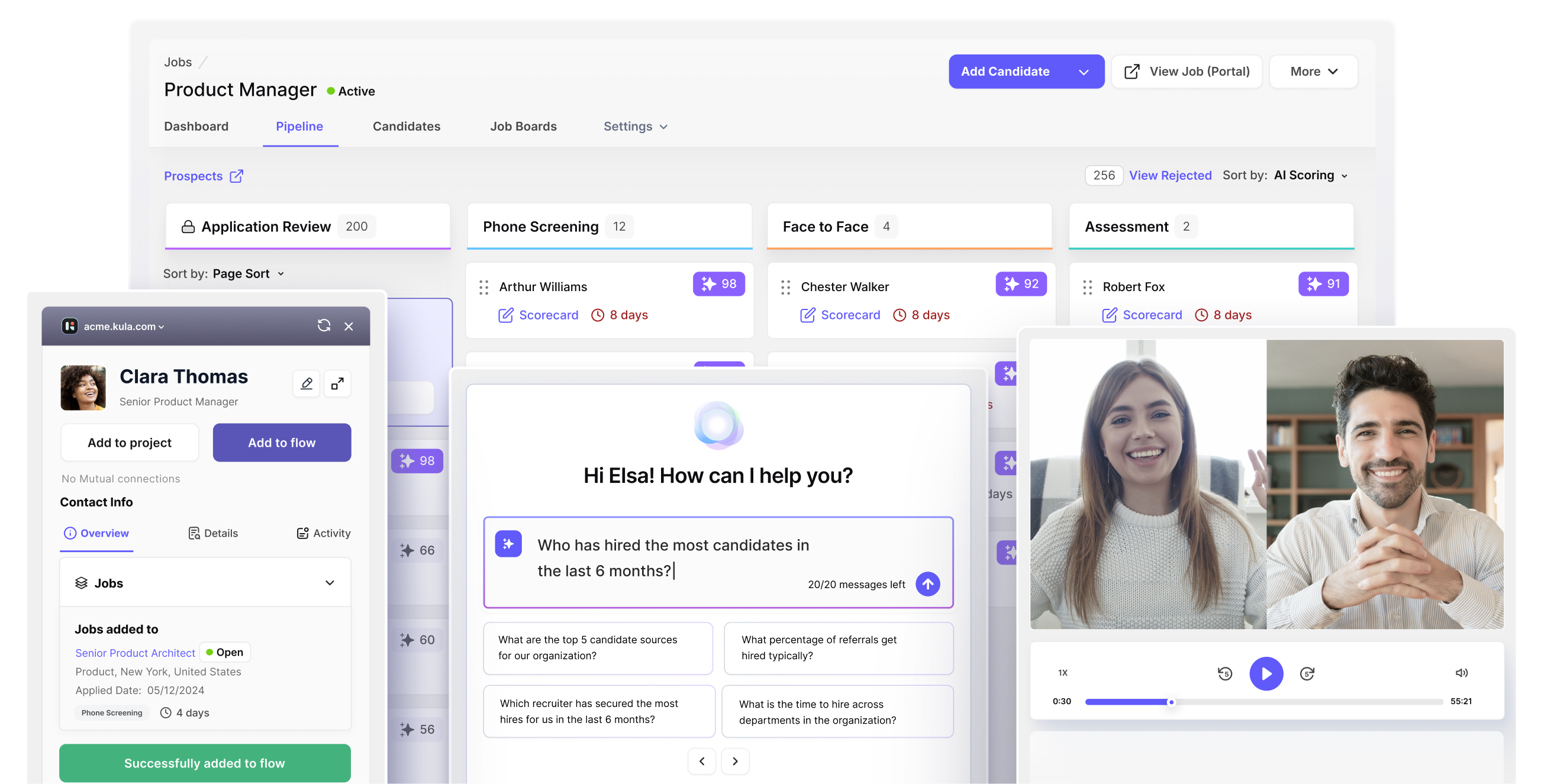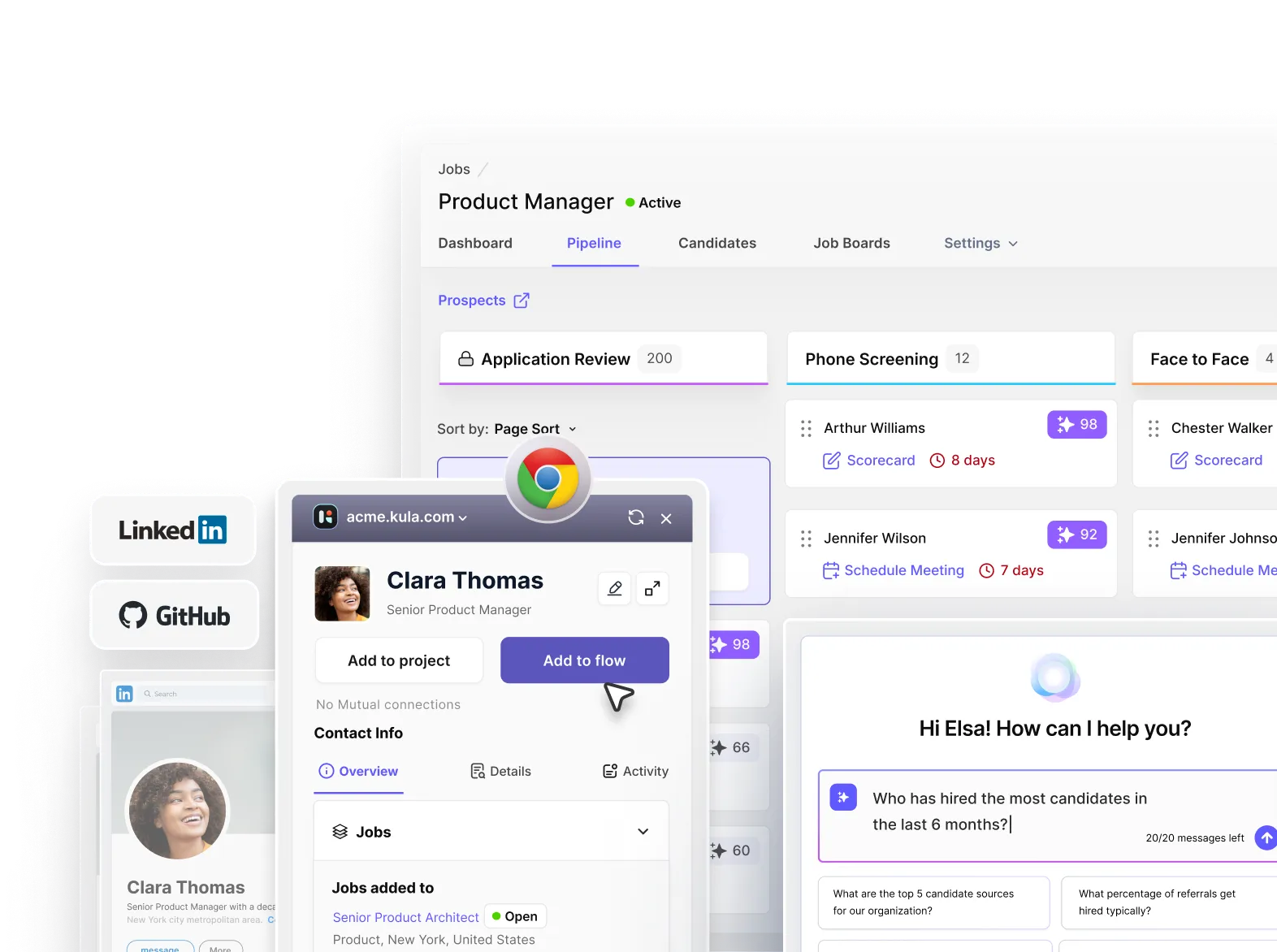Book a 30-minute demo and learn how Kula can help you hire faster and smarter with AI and automation
For the second episode of Recruiters on Record, our no-fluff recruiting podcast, we had conversations with our dear friend and a rockstar recruiter, Pradeep Desu.
After failing at 75 odd interviews and freezing during the interviews in the initial days of his career, Desu has risen through the ranks. Once a Call Center Executive at Amazon, Desu is now the Group Head of Talent Acquisition and India GM at GoTo. In his previous stints, he took up recruiting roles at Qualcomm, Uber, and Stripe among others.
In this episode, we asked Desu to share his frameworks and tricks that answer the widely asked question “How do I climb the career ladder as a recruiter?”
He shared some of the most important things every recruiter can benefit from.
How to shortlist and crack jobs for yourself as a recruiter?
- Think of your career in decades than in months
“Days are always long but years are shorter,” says Desu. So when you set out to look for your next job, don’t think of temporary wins. Every time there’s an opportunity, go back and assess if the role is aligned with your long-term goals and requirements. It could be the company’s culture, managers, challenges, etc.
Take the job if it matches most of the things that bring you closer to your long-term goal.
- Know what your goal is
There are different things that become a priority at different times in your career. Early in your career, your primary goal would be to learn and grow, nothing else matters. There are times when compensation matters. Then there are times when you need a work/life balance. Choose a job that aligns with your priority at the time and also helps you get closer to your long-term goal.
- Prepare a checklist for yourself
Desu highly recommends, and practices, having a personal checklist that determines what sort of job would make you happy and determine your growth. The checklist can include things like
- Your preferences, non-negotiables, good-to-have
- Types of companies you would and wouldn’t work with
- Types of managers you would want to work with
- Other aspects that personally matter the most to you at work
When you shortlist the companies, use this checklist as your guiding principle. I personally call it a job-switch checklist. That’s how Kula happened for me as well :)
- Consider a mix of internal and external opportunities
If you want a bigger role, move to a startup - where there are fewer resources, and more diversification in opportunities. Gain knowledge and experience that set you up for success at larger companies.
Also, the appetite to experiment with people is lesser in established/newer organizations. But internally, your organization might be more prepared to take a bet on you. So include a mix of internal and external opportunities in your career.
- Take risks, if you can
Desu himself has always taken a lot of risks in his career. He once took a pay cut to join Facebook because he was more inclined to get exposure and grow. He suggests taking risks if you have the flexibility, experimenting and figuring out what works best for you.
How to earn respect in your organization as a recruiter
Treat every search as an executive search, asserts Desu.
Go beyond the basics. Ditch the run-of-the-mill sourcing approach and replace it with data-backed decisions.
Come out with a talent availability market report for your founders and hiring managers
- Check for the availability of the talent in the market for that role
- Understand the target companies
- Understand the talent pool size
Don’t stop at the visibility of hiring in your weekly reporting
Besides the standard updates that you give in your reporting, stand out by talking about the efforts you are putting in towards closing the roles - like the diversity you’re bringing in, the talent pool that you’ve put together, and so on.
Be a thought partner rather than just an executor
The next time you get a requisition, don’t just take it up as a task. Take the time to run your due diligence and put forth your suggestions based on the insights you gather. Tie up your suggestions with business context.
Say your company is hiring for a particular role in one country but you’re unable to find any talent after rigorous work. You can pull up the data of your competitor struggling to hire for the same role in the particular geo and propose to hire from a different country where you get insights on the availability of talent for the said role.
How to transition from IC to a manager in recruiting?
There are a bunch of things that Desu suggests
Be prepared for hiccups
No matter how efficient you’ve been at your job as an individual contributor (IC), be prepared for mistakes. You will end up making your teammates unhappy, or take inefficient decisions. Don’t beat yourself up for it. Take lessons and move on. But accept that these things are bound to happen/
Never think that you own your team members
Don’t keep your reportees under your thumb. Instead, mold yourself to the working styles of each of your team members. This not only reduces friction but also helps you build amicable relationships with your team as a manager.
Keep up to speed with the changing trends in the industry
Whether an IC or a manager, keeping up to speed with what’s happening in the
market always helps you take better decisions, give better suggestions, continue to evolve with trends, and set you up for success.
Have a personal advisory board
Desu talks about one of his mentors who he’d look up to and go to whenever he needed advice throughout his journey of rising through the ranks. He says that having a sounding board helps in making decisions when you’re evolving into senior roles.
Stay away from fluff
The internet is an ocean of information both random and insightful. It’s vital to choose the right resources that actually increase your knowledge. He suggests reading blogs that inspire and educate and subscribing to podcasts and channels that talk about relevant topics.
Focus on peer learning
No degree can do what learning among your fellow teammates can. When you learn on the go, you learn a lot more beyond your set responsibilities. So focus on peer learning right from the start of your career as a recruiter.
What makes you a standout recruiter?
While this might differ depending on the context and companies, Desu suggestions finding answers to the following questions if you truly want to stand out as a recruiter:
- Are you putting efforts in the right direction?
- Are you conducting effective intake meetings with hiring managers?
- Did you understand the requisition thoroughly?
- Are you more focused on the quantity of resumes or the quality?
- How quickly are you completing the recruiting lifecycle?
- Are you getting back to candidates on time?
- Are you telling enough stories of people? Stories that help organizations bring credibility to hire great talent?
With that, I conclude my notes from Pradeep Desu’s conversation at Recruiters on Record. You can also watch the whole episode here.
Hope you enjoy taking notes as much as I did. Feel free to share what you liked the most or if you have any additions. You can also check the first episode of Recruiters on Record with Dean Da Costa here.
Go ahead, conquer the world. You got this, dear recruiter!






















